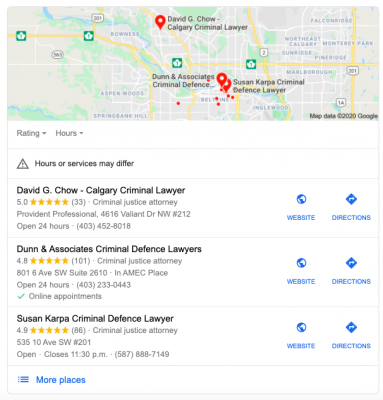Getting Listed in the Google 3-Pack

The Google Local 3-pack appears in 93 percent of searches for Google queries, and it's rumoured that just over 46 percent of Google searches carry a local intent.
People go online to search for everything from clinics to legal services, looking for credible professionals within their vicinity. A MOZ study in 2015 found that 33 percent of web users click on the local 3-pack results, with 40 percent going to results listed below the 3-pack. Organic listings remain a vital force in driving user traffic.
 Local SEO and the Google 3-pack
Local SEO and the Google 3-pack
Local SEO aims to attract people to businesses within their neighbourhood. Google estimated that 97 percent of consumers searched online for local companies in 2017.
While many factors are involved in obtaining 3-pack rankings, it comes down to quality content, user proximity and intention-based queries.
For any business, local SEO rankings can be the difference between getting noticed and being ignored. Even in this time of COVID, when many lawyers work from home, it is essential to pay attention to your local SEO ranking.
How Google determines local ranking
Local SEO rankings are primarily based on relevance, distance and prominence. Here is a quick breakdown of each factor.
Relevance considers how well a local listing matches someone's search intent (the ultimate goal of the person using a search engine). Google tries to connect the user with the right business, so it's essential to include detailed business information on your website as well as off-site web directories to help Google place your firm at the top of the list when someone is seeking a lawyer with your expertise.
Local rankings help people find businesses in their immediate area, making the distance to query relationships important. Even if a search query doesn't include a location-based keyword, Google can estimate the users' range to a business's physical location.
There are a few parts to prominence, the first dealing with how well known a business already is. Museums or retail outlets, for example, are known physical landmarks reflected in the local search results. Prominence also considers the information Google already has about the business through inbound links, articles and web directory details. Online reviews and feedback are another vital prominence factor that can significantly improve a business's local ranking.
Google My Business
Google My Business (GMB) connects your listing to customers across Google Search and Maps. Robust and feature-rich, this proprietary tool allows users to message you directly, ask public facing questions, or leave reviews. It includes a business profile with your address, phone number, website, hours of operation, and more, helping prospective clients find and connect with you. Update your GMB regularly with fresh photos and company news to appeal to potential clients.
Mobile-friendly for Local SEO
Almost everyone carries a smartphone, which they will likely use when searching online for a lawyer. Google gives preference to mobile-friendly information and provides an in-depth look at how important local search is in Understanding Consumers Local Search Behavior.
Highlights of mobile-friendly include:
- Four in five consumers want content to be customized to their city, postal code or immediate surroundings.
- Fifty four percent search for business hours.
- Fifty three percent search for business directions.
- Fifty percent of people who did a local search on their phone went to the physical location within a day.
Positive website experience is critical
As Google explains, "you should build a website to benefit your users, and any optimization should be geared toward making the user experience better."
Google offers user experience tips to help potential clients discover your site:
- Make pages for users, not for search engines.
- Think about what makes your legal practice unique, valuable, or engaging.
- Another useful test is to ask, "Does this page help my users?"
- Make your website stand out from others in your field.
- Avoid tricks intended to improve search engine rankings. A good rule of thumb is whether you'd feel comfortable showing your website to a Google employee.
- Always respect* Google's guidelines.
*Google updates its algorithm and is continuously monitoring the web for sites that have engaged in practices that violate its guidelines.
Create relevant content
Whether people use Google or other search engines such as Bing, or Apple, a critical aspect their algorithms look for when deciding who to position at the top is relevant, useful quality content.
Content should be comprehensive and related to your area of expertise. Generally speaking, Google tends to rank substantive well-written content, with subheads and bullet points to scan and guide the reader. With longer texts, Google has more clues to determine the nuance of what the article is about.
When browsing a lawyer's website, people look for indications of their skills and knowledge. The best way to demonstrate your abilities is by blogging about legal issues that showcase expertise.
Articles must be understandable to general readers, so avoid the legal jargon and obscure terminology commonly found in law journals.
You may want to consider adding FAQs to your website so readers can easily find answers that will encourage people to follow up with you for more information. Fresh well-written content is a crucial ingredient for Google and local SEO. Provide that, and clients should follow.
At ICONA, we have a team of SEO professionals, writers and developers who know how to make a website as SEO-friendly as possible. If you have any questions about content creation, please do get in touch. We are here to help.